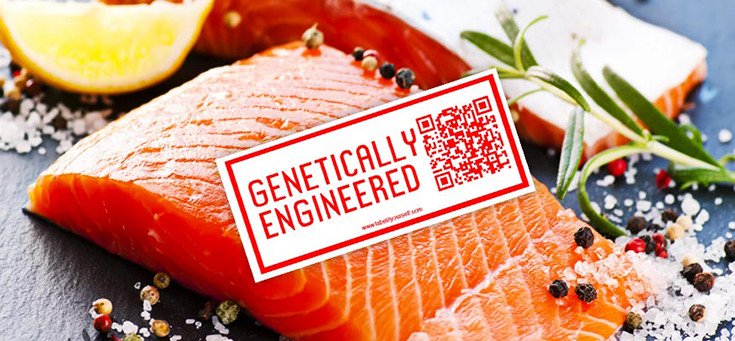US Senator Joins Consumers in Outrage of FDA’s GM Salmon Approval

With the ink barely dry on the FDA’s approval of GM salmon, and several watch-dog groups threatening to sue, U.S. Sen. Richard Blumenthal, D-Connecticut, joins consumer groups wary of the genetically modified fish.
The Senator joined consumer groups who voiced concern on Capitol Hill last week, stating:
“I believe strongly that the consumers have a right to know.”
Cindy Tian, a professor at the University of Connecticut’s Animal Science Department, argues that labeling GMOs would scare the public away from an ‘extensively studied’ practice and that the internet is full of misinformation about GMOs causing cancerous tumors and other health concerns. She claims that there isn’t a single study proving this to be true. She teaches molecular embryology, stem cell biology and reproductive biotechnologies. [1]
Conversely, Blumenthal thinks people deserve to be fully informed.
There are actually numerous studies which prove that not only GM crops, but the pesticides and herbicides used to grow them cause all kinds of health problems, including numerous cancers:
- Published in Food Chemical Toxicology, one study articulates how glyphosate causes human breast cancer cells by interfering with estrogen receptors.
- The most controversial study, conducted by Gilles-Eric Seralini, was forced to be retracted from one journal and then was republished in Environmental Sciences Europe. He found that rats fed genetically modified maize developed multiple cancerous tumors. [2]
- The American Academy of Environmental Medicine (AAEM) expressed concerns about GMO foods, citing animal studies which showed altered structure and function of the liver, oxidative stress, intestinal damage, increased cell growth, disruption of the immune system and over 400 gene expression alternations.
- Canadian research published in the journal Reproductive Toxicology identified the presence of Monsanto’s Bt toxin and other pesticides associated with GMO crops in fetal and non-pregnant women’s blood. According to the study’s researchers, the fetuses were considered to be “highly susceptible” to the possible effects of “xenobiotics.”
Perhaps Professor Tian is on the biotech industry’s payroll? How else could she say there isn’t a single study linking genetically modified food to cancer?
Does it really matter, though, if scientists want to argue about whether or not these foods cause disease? We should have the right to know what we are eating. While the potential GMO-cancer link is important, what we ultimately want is labels so that we know what we are buying and eating.
Sources:
[1] CTPost
[2] Nature

“If the GMO industry can’t survive consumer choice, then those foods shouldn’t be sitting on grocery shelves of American grocery stores, and no scientist, corporation, political entity or university should stand in the way of that democratic process.”
Source: “The Health Effects of Genetically Engineered Crops on San Luis Obispo County,” Compiled by Mike Zelina, Teresa Campbell, Andrew Christie, Mark Phillips, Nancy Reinstein, PhD, RD, Elizabeth Johnson, August, 2006 (59 pages)
—-
“The right to democratic participation addresses the need for justice and equity, which are of major concern in the context of GMO-related decisions. Many young people around the world, particularly the poor and powerless, have little social entry point to influence decisions about GMOs. They should have the right to choose the product that best suits their needs. Of concern is the
fact that future generations have no voice or vote in decisions taken on GMOs today, which means that ways must be found to ensure that their interests are taken into account.”
Source: “Genetically Modified Organisms, Consumers, Food Safety and the Environment- FAO Ethics
Series,” published by: the Food and Agriculture Organization of the United Nations (FOA); Rome, 2001(34 pages)
——-
“If science is held in such high regard by these corporations, why isn’t Monsanto proud of its products? Why in the US doesn’t it label foods containing GMOs and throw open its science to public scrutiny, instead of veiling it with secrecy, restricting independent research on its products or resorting to unsavory tactics? The reason why no labeling has taken place in the US is not due to ‘sound science’ having been applied but comes down to the power and political influence of the GMO biotech sector and because a sound scientific approach has not been applied.”
Colin Todhunter, “Monsanto on the Menu: Science, Knowledge and GMOs,” Global Research, February 13, 2015.
I would ask Cindy Tian, why she feels the public should not have proper labelling to make their own choices, regardless of whether or not she agrees with their choices.
AND, where is the logic of creating a product people HATE, ie no market for, and trying to force it onto them via the sly???